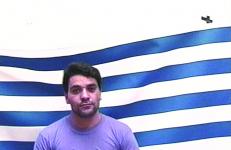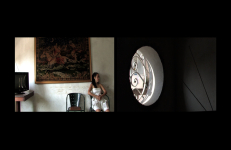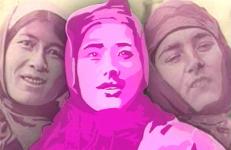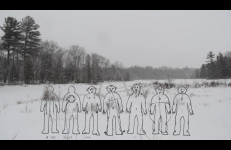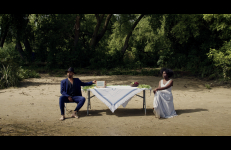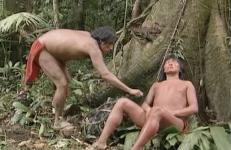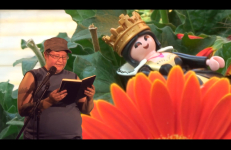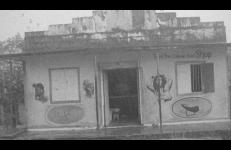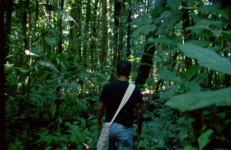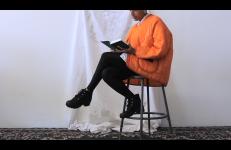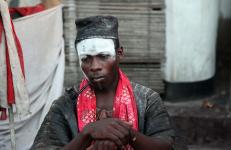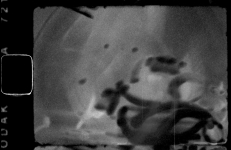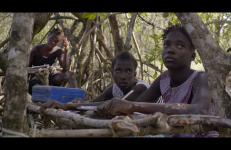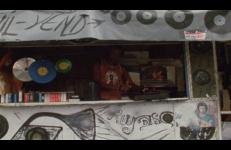Hostage: The Bachar Tapes (English Version) is an experimental documentary about "The Western Hostage Crisis." The crisis refers to the abduction and detention of Westerners like Terry Anderson, and Terry Waite in Lebanon in the 80s and early 90s by "Islamic militants." This episode directly and indirectly consumed Lebanese, U.S., French, and British political and public life, and precipitated a number of high-profile political scandals like the Iran-Contra affair in the U.S.
Post-colonialism
Hotel Globo critically examines the changing urban surface of Luanda through video, photographic and performative incursions into the interior landscapes of the 1950s Hotel Globo in Luanda, Angola. The modernist hotel is still functioning in Luanda’s downtown, whose architectural heritage has been increasingly replaced with gentrified high-rise luxury buildings.
Adapted from psychologist A.R. Luria’s research in the Islamic outskirts of the Soviet Union in the 1930s, How to Fix the World brings to life Luria's conversations with Central Asian farmers learning how to read and write under the unfamiliar principles of Socialism.
Colorful digital animations based on Max Penson's photographs of collective farmers play against a backdrop of landscape images shot in Uzbekistan in 2004.
In(sul)ar marks the dichotomy between reality and fiction, by creating meta-images of an imagined island, where time and space are confused with each other. In(sul)ar reflects the relation between space, memory and history, as well as the mapping of the body and its relation with architecture, and identity. A women walks through spaces of ruin and old erased memories in spaces located in Azores, an Island in the Atlantic which is at the crossroads in between Europe and Africa.
Adam Khalil and Zack Khalil’s debut film re-imagines an Anishinaabe story, the Seven Fires Prophecy, which both predates and predicts first contact with Europeans. A kaleidoscopic experience blending documentary, narrative, and experimental forms, INAATE/SE/ explores how the prophecy resonates through the generations in their Indigenous community on the Michigan/Canadian border.
Adam Khalil and Zack Khalil’s debut film re-imagines an Anishinaabe story, the Seven Fires Prophecy, which both predates and predicts first contact with Europeans. A kaleidoscopic experience blending documentary, narrative, and experimental forms, INAATE/SE/ explores how the prophecy resonates through the generations in their Indigenous community on the Michigan/Canadian border.
After 500 years of African presence in Portugal, Black people find refuge in the utopian creation of The Island (A Ilha). A place founded in African history, a place to rest and to create futures. A place residing in the space in between fiction and reality, where the potentialities to re-write histories and think futures are brought together through the characters and their journeys.
Using footage from mainstream British and Hollywood films, and excerpts from a poem by Shani Mootoo, this video explores the impact of cultural imperialism and the erasure of language—residual tools of oppression on members of post-colonial societies.
This title is also available on The New McLennium.
Four tales about cannibal monsters narrated and performed by the Waiãpi Indians. “We have made the video,” say the Waiãpi, “to teach people to be more careful with monsters they never heard about. Even a white man can be eaten as he goes into the forest.”
Directed by Vincent Carelli and Dominique Gallois.
Edited by Tutu Nunes.
In Waiãpi with English subtitles.
Four tales about cannibal monsters narrated and performed by the Waiãpi Indians. “We have made the video,” say the Waiãpi, “to teach people to be more careful with monsters they never heard about. Even a white man can be eaten as he goes into the forest.”
Directed by Vincent Carelli and Dominique Gallois.
Edited by Tutu Nunes.
In Waiãpi with English subtitles.
Invited to speak at an Indigenous Revolutionary Meeting, the narrator describes an intimate encounter with an Evil Colonizing Queen which leads to Turtle Island's contraction of an invasive European flora.
This title is also available on the compilation What Was Always Yours and Never Lost.
A voyage into the labyrinthine memories of a Uitoto man, who worked for the drug Lords in the Colombian Amazon back in the 80s. Following his path between the forest and the ruin of a Narco's mansion imitating the Carrington mansion in the soap opera Dynasty, the film unfolds the hallucinatory account of a near-death experience.
Language Lessons entwines the search for the fountain of youth with the dream of a common language. The fountain both promises and frustrates eternity, while this dream offers hope for common ground. The lessons, made vivid by watery, elemental images and multiple voices, suggest that communication remains at the limits of our imagination.
Music by Pamela Z.
Language Lessons entwines the search for the fountain of youth with the dream of a common language. The fountain both promises and frustrates eternity, while this dream offers hope for common ground. The lessons, made vivid by watery, elemental images and multiple voices, suggest that communication remains at the limits of our imagination.
Music by Pamela Z.
Sections 1-30 of an incomplete extended poem describing the artist's connection to the radical black tradition. The completed poem will be formed of 180 sections.
"Lessons are all about constraints; they are thirty seconds, must feature a black figure, and I have rules about where to make cuts, how to edit sound, etc."
— Martine Syms in conversation with Aram Moshayedi, Mousse Magazine
Sections 31-60 of an incomplete extended poem describing the artist's connection to the radical black tradition. The completed poem will be formed of 180 sections.
"Lessons are all about constraints; they are thirty seconds, must feature a black figure, and I have rules about where to make cuts, how to edit sound, etc."
— Martine Syms in conversation with Aram Moshayedi, Mousse Magazine
“To take back the gold that was stolen from us – this is the object of our actions.”
Lettres du Voyant is a documentary-fiction about spiritism and technology in contemporary Ghana, which attempts to uncover some truths about a mysterious practice called "Sakawa" — internet scams mixed with voodoo magic. Tracing back the scammers’ stories to the times of Ghanaian independence, the film proposes Sakawa as a form of anti-neocolonial resistance.
“Trying to think the revolution is like waking and trying to see the logic in a dream...”.
A Two Spirited woman surrounded by spy signals and psychiatric walls attempts to make sense of love, global paranoia, and her place in the history of colonialism. Spliced in between her monologues are the binary codes of all the psychiatric drugs she has taken.
Lumbreras is the historical and archeological place of the bones, ruins and detritus. A window thought time, an ancestral rhythm of the audiovisual materials.
Incorporating appropriated television footage as artistic experimentation and social critique, Chilean artist Magaly Ponce retells a history of violence and repression from her point of view. Magnetic Balance is a self-portrait of the artist as a member of a generation she terms the "children of Pinochet." Recalling the circumstances surrounding the execution of a family friend in 1973 at the onset of the Pinochet dictatorship, Ponce reexamines her relationship to Chilean society.
We recently went to Guinea Bissau to research the guerrilla schools of the mangroves. Instead, we soon became ourselves the apprentices and the first lesson we had to learn was how to walk. If you walk straight, placing your heels on the ground first, you promptly slip and fall in the dams of the flooded mangrove rice field or you get stuck in the mangrove mud. You need to lower your body, flex your knees and stick your toes vertically into the mud, extend your arms forwards in a conscious and present movement. In the mangrove school the learning happens with the whole body.
We recently went to Guinea Bissau to research the guerrilla schools of the mangroves. Instead, we soon became ourselves the apprentices and the first lesson we had to learn was how to walk. If you walk straight, placing your heels on the ground first, you promptly slip and fall in the dams of the flooded mangrove rice field or you get stuck in the mangrove mud. You need to lower your body, flex your knees and stick your toes vertically into the mud, extend your arms forwards in a conscious and present movement. In the mangrove school the learning happens with the whole body.
The Diaspora Suite
Filmed on location in Salvador, Brazil (the last city in the Western Hemisphere to outlaw slavery) and Harlem, NY ( an international stronghold of the African Diaspora), Many Thousands Gone draws parallels between a summer afternoon on the streets of the two cities. A silent version of the film was given to jazz multi-instrumentalist Joe McPhee to use an interpretive score. The final film is the combination of the images and McPhee’s real time “sight reading” of the score.




